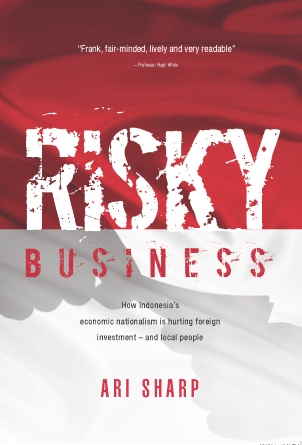Review: ‘Risky Business’ by Ari Sharp
Sometimes, it seems Indonesia can be its own worst enemy. Over a dinner in Jakarta recently, a businessperson with long experience interacting with Indonesian policymakers lamented that politicians and bureaucrats here ‘had begun to actually believe their own rhetoric’.
The easy years of the commodity prices boom, he said, gave rise to a complacency that prompted some Indonesian bureaucrats to essentially tell foreign investors that — no matter what the issues with the investment climate — they’ll come anyway because Indonesia is too important a market to ignore. From the economic disaster of the Asian Financial Crisis in 1997-98 to the commodities boom years under President Susilo Bambang Yudhoyono, Indonesia swung from despair to hubris mighty quickly, some foreign observers worry.

Australian journalist Ari Sharp is one of them. In his new book, Risky Business: How Indonesia’s economic nationalism is hurting foreign investment—and local people, Sharp provides a reality check on the Indonesian boom narrative, using stories of troubled foreign investment projects to illustrate how ‘through a combination of legislative edicts, ministerial utterances and dubious court rulings, Indonesia’s elite has sought to demonstrate that the country is not open for business’.
A few tales stand out: the Australian mining company which discovered a huge coal deposit in Kalimantan, only to be pushed off its concession by a politically-connected firm after some suspicious court decisions; threats of revoking visas made to executives of ExxonMobil to speed up production at a local field; the crazed Attorney-General’s Department prosecutors pursuing Chevron executives for trumped-up corruption allegations in the face of bafflement from regulators, the industry, the anti-corruption commission and the mining ministry; and, of course, the complete debacle that was the recent ban on the export of raw minerals, enacted with apparent disregard for its effect on the Indonesian economy.
Written from the perspective of a journalist and editor (Sharp spent two and a half years at the English-language Jakarta Globe newspaper), rather than a businessperson or consultant, the nine case studies which the book deals with illustrate convincingly that Indonesian policymakers often display little regard for what might be described as Creating a Healthy Investment Climate 101: the rule of law, policy stability, and functional communication with the private sector.
This could easily have turned into an exercise in tiny-violin-playing on behalf of multinational corporations (won’t somebody think of poor old ExxonMobil?), but to his credit Sharp always keeps the Indonesian public as his main protagonist. If the Indonesian government restricts imports of food to ‘promote’ local production, he points out, the ones who suffer are poor Indonesians when food prices spike. When Indonesian authorities give foreign resources firms a hard time, it’s the Indonesian economy which misses out on jobs and capital. And so on. The overriding theme is that Indonesian elites are often happy to place some notion of national ‘dignity’ and disdain for foreign companies over hard-headed analysis of what’s best to grow the economy—or worse, cloak rent-seeking behaviour in the language of economic nationalism.
Indonesia-watchers with pre-existing knowledge of the book’s case studies will probably be left wanting more in-depth investigation of processes which Sharp describes largely based on media reports. But as the author points out, the book is first and foremost aimed at readers overseas with an interest in Indonesian affairs. Aside from its accessibility to non-experts, these readers will benefit from the fact that Sharp is a good writer, his journalistic experience and sense of humour giving him a knack for storytelling.
So the big question is whether the picture Sharp seeks to draw from these case studies is an accurate one. Needless to say, the book’s general attitude towards free trade and investment is what would be denounced as neoliberalisme in Indonesia. The book’s publisher, Connor Court, is known for its focus on conservative screeds from authors like Cory Bernardi and Ian Plimer, so the free-market bent of the book is not surprising. This doesn’t necessarily make it wrong—indeed, most Australians would recognise the book’s remedies for Indonesia’s investment climate funk as common sense economics.
I do wonder, though, whether the case studies’ being weighted towards resources projects overstates how bad things are overall. As Sharp mentions in his conclusion, there are plenty of success stories of foreign firms’ involvement in consumer services in Indonesia, for instance. Another tremendously important issue for Indonesia is growing its labour-intensive manufacturing sector, which is being held up not by economic jingoism (Indonesians love their Samsung phones and Levis), but the more mundane issues of poor infrastructure and rigid workplace relations laws. It is only in particular sectors, it seems, where foreign investment really pushes the buttons of protectionists.
In the highly-politicised resources sector, researchers like the ANU’s Eve Warburton caution against reading the current nationalist climate in the resources sector as a cloak for rent-seeking, seeing ‘a strong ideational component to the rise of [economic] nationalism in Indonesia that deserves greater…attention’ from those commenting on the foreign investment regime there. While Sharp does put the current nationalist zeitgeist in historical perspective and rightly identifies rising inequality as aiding popular disillusionment with globalisation, I though there was room for a more detailed explanation for outside readers of the deep ideological roots of Indonesian protectionism.
With those few issues aside, Risky Business is overall an insightful, useful and timely book for Australians, given the tendency of our political leaders and pundits to shy away from the tough realities of Indonesia’s political economy which hold up greater economic integration between us and our neighbour. In his debut book, Ari Sharp has delivered an entertaining (sometimes perversely so) and critical look at Indonesia’s foreign investment scene which deserves to be widely read by those keen to go beyond marketing slogans.
You can order Risky Business online through Readings, Amazon or the Book Depository. Thanks to Ari Sharp for providing a review copy.

